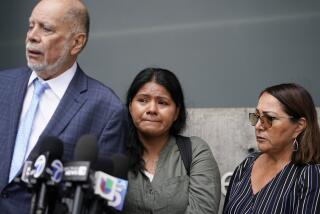‘Natural’ Doesn’t Mean Harmless
- Share via
If lab tests confirm that pep pills contributed to the death of Rosanna Porras, it would underscore that the drug problem facing today’s families is no longer limited to marijuana, cocaine and other illegal substances. Or even to familiar but often-abused forms of alcohol and tobacco.
Without proper education and care, deadly danger can lurk in pretty packages sold at health food stores.
There may be a place in our go-go society for products such as Ripped Fuel, the “metabolic enhancer” taken by 15-year-old Rosanna before soccer practice at Fillmore High School. But that place is not in the hands of teenage athletes dosing themselves without adult guidance or a doctor’s advice.
Rosanna--class president, soccer and volleyball player with a 3.7 grade-point average and passions for drawing and reading--collapsed during the practice and died three days later. Her family and doctors are blaming the pills and lax government regulation of the over-the-counter natural remedies.
The main ingredient in Ripped Fuel is ephedrine, which is also the main component of methamphetamine. Yet the product is marketed not as a drug but as a food supplement.
The U.S. Food and Drug Administration has received more than 800 complaints about ephedrine-related problems and is considering drafting restrictions in the next six months, including requiring companies to recommend much lower dosages. Under a 1994 law, the agency must prove dietary supplements are harmful before it can regulate them.
It could take weeks to determine whether Ripped Fuel led to Rosanna’s death, but one thing is clear right now:
Parents and coaches should talk with their kids about the potential dangers of taking pills without a doctor’s approval. Even if the FDA begins to regulate such “natural” products as the dangerous drugs they are, the best defense will always be consumers who know to be wary about whatever they put in their bodies.
More to Read
Sign up for Essential California
The most important California stories and recommendations in your inbox every morning.
You may occasionally receive promotional content from the Los Angeles Times.













